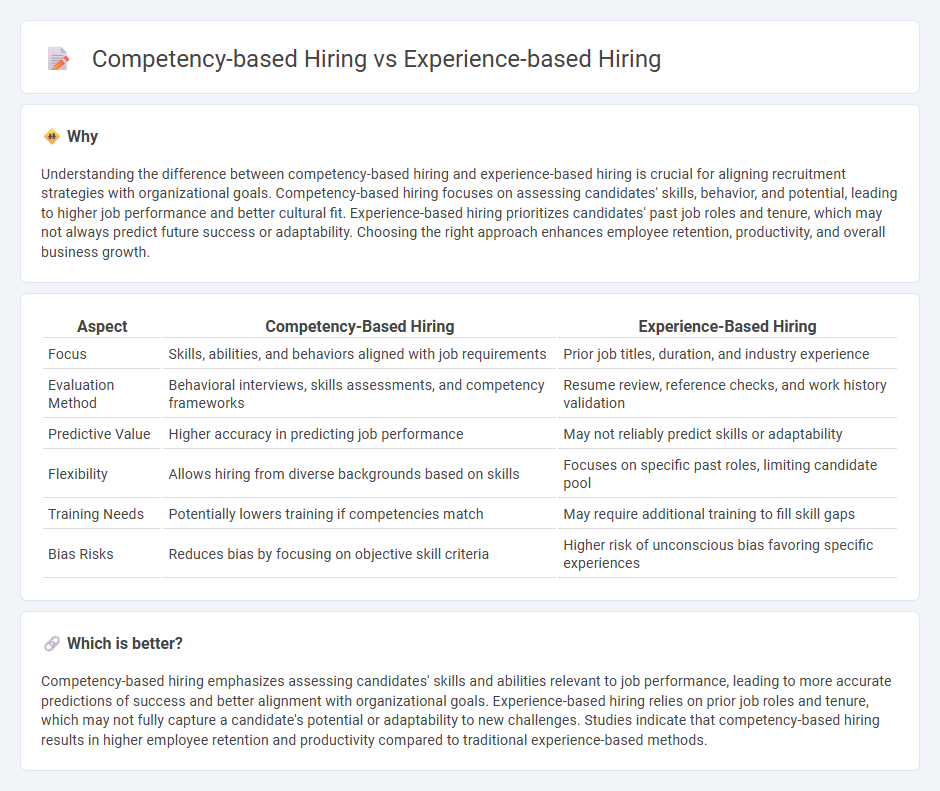
Competency-based hiring evaluates candidates through skills, behaviors, and job-related abilities, ensuring alignment with organizational goals and improved performance outcomes. Experience-based hiring focuses primarily on a candidate's past roles and years of work history, sometimes overlooking potential and adaptability. Explore how choosing the right hiring approach can transform your talent acquisition strategy.
Why it is important
Understanding the difference between competency-based hiring and experience-based hiring is crucial for aligning recruitment strategies with organizational goals. Competency-based hiring focuses on assessing candidates' skills, behavior, and potential, leading to higher job performance and better cultural fit. Experience-based hiring prioritizes candidates' past job roles and tenure, which may not always predict future success or adaptability. Choosing the right approach enhances employee retention, productivity, and overall business growth.
Comparison Table
| Aspect | Competency-Based Hiring | Experience-Based Hiring |
|---|---|---|
| Focus | Skills, abilities, and behaviors aligned with job requirements | Prior job titles, duration, and industry experience |
| Evaluation Method | Behavioral interviews, skills assessments, and competency frameworks | Resume review, reference checks, and work history validation |
| Predictive Value | Higher accuracy in predicting job performance | May not reliably predict skills or adaptability |
| Flexibility | Allows hiring from diverse backgrounds based on skills | Focuses on specific past roles, limiting candidate pool |
| Training Needs | Potentially lowers training if competencies match | May require additional training to fill skill gaps |
| Bias Risks | Reduces bias by focusing on objective skill criteria | Higher risk of unconscious bias favoring specific experiences |
Which is better?
Competency-based hiring emphasizes assessing candidates' skills and abilities relevant to job performance, leading to more accurate predictions of success and better alignment with organizational goals. Experience-based hiring relies on prior job roles and tenure, which may not fully capture a candidate's potential or adaptability to new challenges. Studies indicate that competency-based hiring results in higher employee retention and productivity compared to traditional experience-based methods.
Connection
Competency-based hiring and experience-based hiring are interconnected as both prioritize the candidate's ability to perform job-specific tasks effectively. Competency-based hiring focuses on assessing core skills and behaviors required for the role, while experience-based hiring evaluates past roles and accomplishments to predict future performance. Combining these approaches enhances talent acquisition by ensuring candidates possess both relevant skills and proven practical experience.
Key Terms
Work History
Experience-based hiring emphasizes candidates' previous job roles and duration, prioritizing years spent in specific positions to gauge suitability. Competency-based hiring assesses skills, behaviors, and abilities demonstrated through practical examples, regardless of tenure. Explore how integrating both approaches can enhance your recruitment strategy for better talent alignment.
Skills Assessment
Experience-based hiring evaluates candidates primarily on their previous job roles and tenure, often emphasizing industries served and years worked. Competency-based hiring centers on assessing specific skills and behaviors through targeted skills assessments, measuring candidates' abilities to perform designated tasks effectively. Explore our comprehensive guide to understand how skills assessment transforms hiring decisions.
Behavioral Interviewing
Experience-based hiring evaluates candidates primarily on past job roles and accomplishments, emphasizing the duration and relevance of their work history. Competency-based hiring assesses specific skills and behaviors critical to job success, often using behavioral interviewing techniques to predict future performance based on past behavior. Explore how behavioral interviewing bridges these approaches to enhance talent acquisition effectiveness.
Source and External Links
Skill-based Hiring and Experience-based Learning for the Win - Experience-based hiring focuses on practical, hands-on learning and skills acquisition, which combined with skills-based hiring, helps employers tap a broader and more diverse talent pool, emphasizing abilities over formal education or job titles.
Skills-based Hiring: Stop Hiring for Experience - This approach prioritizes candidates' skills and accomplishments rather than traditional experience or educational pedigree, as hiring based solely on experience can overlook talent and reinforce biased hiring practices.
Skills vs. Experience: What Matters More for Hiring? - Studies show that hiring based on skills is over twice as predictive of job performance compared to hiring based on past experience, and skills-first hiring widens the talent pool while improving hire quality.
 dowidth.com
dowidth.com